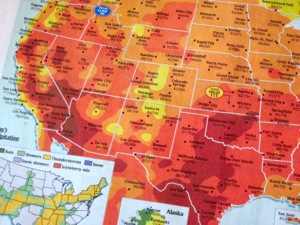Berkeley study affirms temperature trends cited in major climate reports

Just in case you’ve been wondering, the world is getting warmer. Not everywhere but overall, things are heating up pretty much as advertised. A comprehensive study of temperature records — some of which had been under attack by climate change skeptics — concludes that the average global land temperature has risen one degree (Celsius) since the mid-1950s.
The project, known as the Berkeley Earth Surface Temperature Study, was launched by a team of scientists from various institutions, to address charges that climatologists had been relying on shaky data from temperature-logging stations around the world.
The authors noted that the oceans did not warm as rapidly over the same period and the 1-degree finding (closer to two degrees Fahrenheit) is for the Earth’s total land mass.
The study drew on a massive combined database of 1.6 billion records. About a third of the sites monitored in the study showed a cooling trend over the past 70 years, while two thirds revealed warming.
They also found that the oft-cited “urban heat island” effect, while genuine, has not had a major influence on average temperatures overall, mostly because urban areas account for less than one percent of the planet’s land mass.
The work was led by UC Berkeley physicist Richard Muller, whose book, Physics for Future Presidents, offers some challenging views of the global warming debate. His involvement in the temperature study raised some eyebrows when it was revealed that it was partially funded by David Koch, an oil magnate who has spent millions to fight climate policy at the national level and in California. But when Muller was summoned by a Republican-led congressional panel last spring, he deflated skeptics by telling the hearing that so far, his findings supported conclusions of the UN’s IPCC (Intergovernmental Panel on Climate Change) and others. In a news release (available as a PDF download), Muller said that this particular study does not draw any conclusions about the cause of the warming.
UPDATE: The study has not appeared to mollify some ardent critics of the prevailing climate science, as Leslie Kaufman writes in this New York Times Green post.
4 thoughts on “Yep, It’s Warmer Out There…But Not Everywhere”
Comments are closed.

Yep, when will be get to see the peer reviewed studies, this is a PR campaign?
Should we be concerned about the parts of the earth, one-third according to Muller, that are cooling.
Richard Muller sure knows the formula to get exposure from the media…be a respected scientist, deny something supported by overwhelming evidence, and make a case that you are in a unique position to “finally get the truth”.
Of course the results supported what was known years ago by the vast majority of climate scientists all over the world.
What’s next, a guest on one of the talk shows on the Oprah Network?!?!?
Heh–I enjoyed this comment, Jon, especially since we were just talking about doing an interview with him. But to be fair, I think Muller has been somewhat miscast as a denier.
Certainly he has posed some provocative questions about the prevailing science. But even in his book, when he calls out flaws in the analysis that led to the influential “hockey stick curve,” he’s careful to point out that the basic veracity of the curve was affirmed by the most trusted scientific body in the land (with a caveat on the timeline). Certainly he did no favors for Capitol Hill skeptics in his testimony last spring.
I think he’s had doubts and has simply sought to test those doubts. Now that he has, I’m not sure he’ll be getting more grants from the Koch Bros, however.